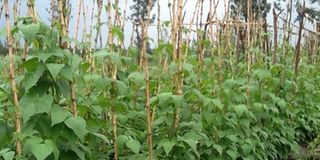Researchers develop beans that cook in 15 minutes

Most of the beans in East Africa are produced by small holder farmers, therefore the initiative to produce quick-cooking beans will enhance their livelihoods. File photo
Beans are an important staple food in sub-Saharan Africa, particularly in rural areas of Eastern Africa adding that one of the biggest limiting factors to bean consumption is the time required to cook them and, consequently, the amount of fuel or firewood required for cooking.
However, an innovative project, with researchers working in collaboration with farmers and the private sector, is developing bean products that cook in 15 minutes or that are ready to eat for Kenya and Uganda.
High in fibre, protein, complex carbohydrates, folic acid, iron and zinc – beans are great for enriching our diets, especially for pregnant women and growing children.
But in rural areas, firewood for cooking is time-consuming to collect and, in urban areas, charcoal is expensive.
By engaging farmers and the private sector to introduce a range of quick-cooking and ready to eat bean products to suit different consumers (rural, urban and peri-urban), this East African beans project is set to impact in a number of ways on farmers and consumers across Kenya and Uganda.
The project is being supported by the Cultivate Africa’s Future (CultiAF) Fund, a $15 million initiative jointly funded by Canada’s International Development Research Centre and the Australian Centre for International Agriculture Research.
‘As opposed to 2 hours with traditional unprocessed dry beans, the new precooked products will take 10-15 minutes to cook,’ explains Dr. Michael Ugen, the spokesperson of the project from Kenyan National Agricultural Research Organization and principal investigator for the bean project.
This significant reduction in time will not only have beneficial impacts on the environment and urban and rural household finances with less fuel being used, but also on men and women’s decision-making and time allocation within households.
“Generally, the responsibility of collecting firewood and cooking falls to women and children. By reducing the time needed to prepare beans and collect the fuel to do so, valuable time becomes available for women, and as a result the possibilities of using their time for other important activities” emphasizes Dr. Ugen.
Dr. Urgen said they are also introducing farmer groups to local government, extension workers and microfinance institutions such that in the long-run, farmers would be able to support a sustainable quick-cooking and ready to eat bean market.
He noted that the project intends to develop the market for these quick-cooking and ready to eat bean products by creating a successful value chain from seed to supermarket shelf, of which farmers shall be engaged to produce the beans, private sector processors for product development, as well as working with local supermarkets, agricultural extension workers and local government.
To date, 47 bean varieties (15 from Kenya and 32 from Uganda) have been screened and 17 selected for further evaluation and product prototype development.
In Uganda, 10 of the 17 initial varieties have been selected for seed production so that farmers can grow these suitable beans on a commercial scale for processing.
Overall bean production in East Africa is mostly carried out by small-scale farmers with only 0.4 to 0.8 hectares of land per family.
7,000 farming families have already been selected to participate in the project (3,000 from Kenya and 4,000 from Uganda) that will provide training in better agronomic practices to produce bean varieties for processing into quick-cooking and ready to eat bean products; and in how to organize better in formal groups.
The challenge however, at this stage is making sure farmers have the seeds to cultivate in order to produce enough precooked beans to meet processing demand from their private sector partners including Lasting Solutions.
The project, which continues until March 2017, is being supported by the Cultivate Africa’s Future (CultiAF) Fund, an initiative jointly funded by Canada’s International Development Research Centre and the Australian Centre for International Agriculture Research.
In Uganda, the partners include researchers from the National Agricultural Research Organization (NARO), the International Centre for Tropical Agriculture (CIAT) and the Pan African Bean Research Alliance (PABRA); Community Enterprises Development Organization, a seed company involved in seed and grain production and capacity-building of farmers and Lasting Solutions, a processing company. Similarly in Kenya, researchers from the Kenya Agricultural and Livestock Research Organization (KALRO), CIAT, PABRA and Smart Logistics Solutions, a private sector company are also involved in the project.




